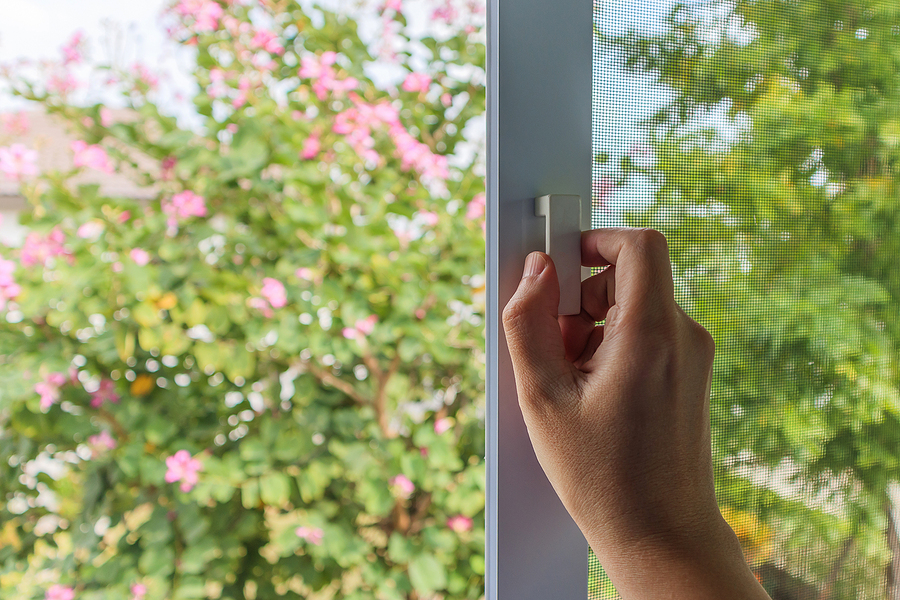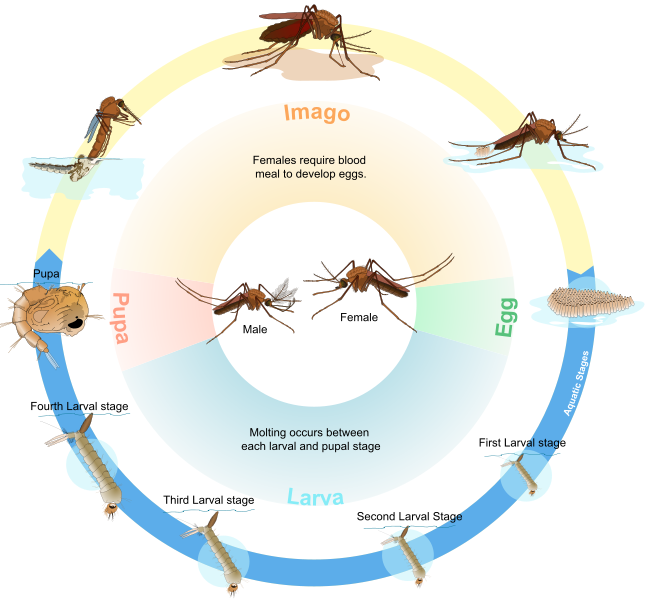When are mosquitos active?
With South Carolina’s warm climate, “mosquito season” generally lasts from March to October. However, the peak of mosquito activity is during the warm Summer months. Depending on rainfall and temperatures in a given year, mosquitos may become active at different times.
A summary of the mosquito life cycle
The mosquito life cycle is comprised of four stages. Varying by species and environmental conditions, the entire cycle typically takes about two weeks but can range from 4 days to a month. (source)
Stage 1: Egg
Mosquitos lay their eggs in wet environments, as they require water to hatch. Many species can lay hundreds of eggs throughout their life.
Stage 2: Larva
Larvae hatch from the eggs, which live in water and molt multiple times before becoming pupae. They commonly swim along the surface by wiggling their bodies around, hence their common nickname “wigglers” or “wrigglers.”
Stage 3: Pupa
After several stages of molting, larvae metamorphose into pupae. At this point they no longer feed. However, like the larva stage, they still swim around in the water and surface for air. Their abdomen-flipping motion has earned them the nickname of “tumblers.”
Stage 3: Adult
Depending on the species and environment, an adult mosquito may emerge from a pupa after a period of a few days or more. Only adult females feed on blood, while males survive on nectar and sugar. Females lay eggs after a blood meal, starting the cycle anew.
Controlling Mosquitoes in South Carolina
Mosquito bites are annoying and itchy, but they can also be legitimately dangerous. While it is not completely widespread, West Nile Virus is still carried by some mosquitos in South Carolina.
The best way to prevent and eliminate mosquitos from your home and yard is to remove opportunities for them to breed. Follow these tips to prevent mosquitos from overrunning your home:
- Call a pest control expert for quick, professional removal of dangerous mosquito populations.
- Remove any standing water from your property. Stagnant pools are the ideal environment for mosquitos to lay their eggs and multiply.
- Fill in holes that are prone to hold water after rainfall.
- Clear out leaves and debris from gutters.
- Ensure your doors and windows are insulated and/or screened to prevent mosquitos from entering the home.
- Cover or remove objects and outdoor furniture that can collect stagnant water.
- Clean your swimming pool regularly.
- Use bug lights and mosquito repellent for short term relief from mosquitos.
Mosquito Skills: Mosquito Control Service in Georgia & South Carolina
Are mosquitos breeding in your yard and around your home? Contact our Greenville pest control company or our Anderson pest control team for a free estimate.
Compass Pest Management is a local pest control company with decades of experience eliminating mosquitos in Georgia and South Carolina. Learn more about our tried and true Mosquito Skills treatment program, or contact us today with any questions you may have. Ready to start? Schedule your FREE inspection and estimate!
About Compass Pest Management
Compass Pest Management is a full-service pest control company serving north Georgia and Upstate South Carolina. We offer residential and commercial pest control services for termites, ants, cockroaches, mosquitoes, bed bugs, and more. We also offer wildlife removal services and TAP insulation, an insulation product that doubles as built-in pest control. We’re committed to using the safest, EPA-approved products to keep you and your family safe, healthy, and comfortable. Contact us for effective, local pest control services you can trust.


